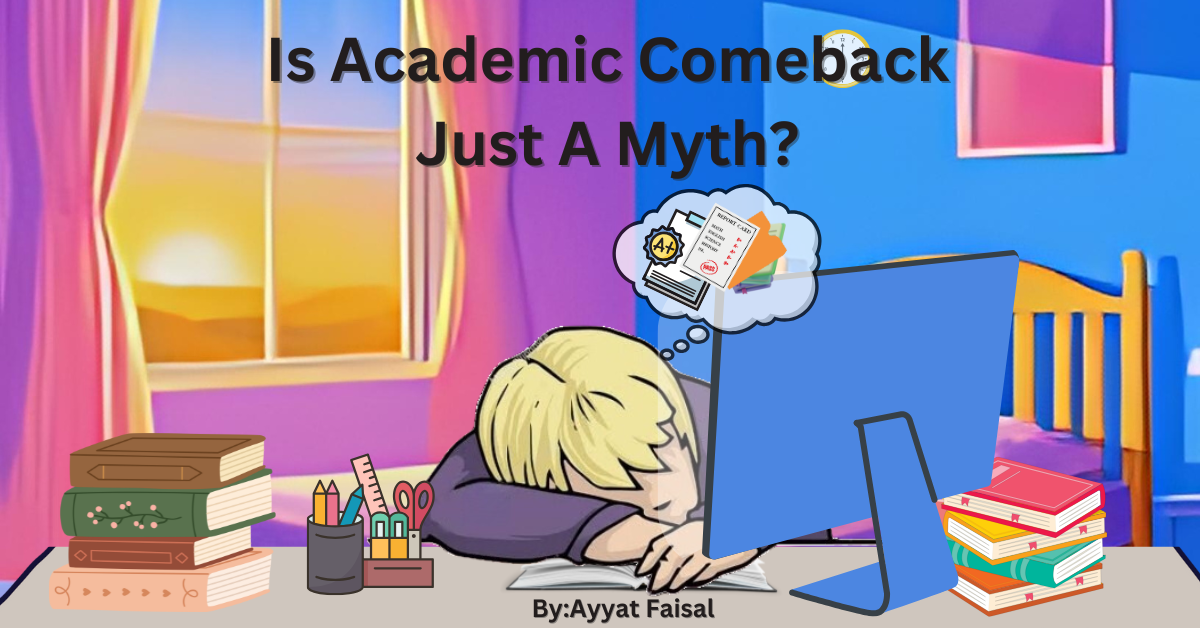Like Fawkes the phoenix from Harry Potter, ever so gracefully emerging to life from his own ashes, every A-level student fantasizes about their very own rebirth, a renewed chance at what’s infamously “the most academically challenging phase.” Often times, this rebirth comes in the form of the rather notorious: Academic Comeback. So buckle in and cue “Give me some sunshine” on your headphones, while I take you on a daunting deep dive into the question: Is academic comeback just a myth?
A myth, as Merriam-Webster defines best, is “a person or thing having only an imaginary or unverifiable existence.” Think “Imaginary” “unverifiable” “non-existent” rings a bell yet? Dare I say that this definition has an uncanny resemblance to your latest academic endeavors? With any academic phase comes its own set of burdens. And no, I’m not referring to the statistical challenges of your subjects or the required study hours, but rather the unrealistic expectations that accompany them—specifically, the standard you’ve set to never accept failure, viewing it as something inherently negative (divided by subjects, united by perfectionism.)
Therefore, amidst a few failed attempts at college applications, extracurriculars, socializing, maintaining your scholarship or overall having the picture-perfect reputation of a prodigy, is it not human nature to look for a flicker of hope? That flicker of hope, after a set of failures and unsuccessful attempts, is the very “Academic Comeback” we dream of.
“It is never too late (or is it?)”:
The line between “it’s never too late” and “there’s a right time for everything” is quite thin, and a procrastinating student uses that very line as a jump rope, constantly switching back and forth between surrendering or unleashing their inner academic weapon.
After your latest failure made you give up on the idea of ever succeeding again, or your procrastinator tendencies got the best of you, the idea of consistent studying seems utterly exhausting and frankly, wasteful, to say the least. Days are spent zoning out during class, and binging netflix at night. That is, until the most-awaited exam date sheet finally comes in. What does one do then? Accept defeat? (because, what is it if not the consequences of one’s own actions?) Just when giving up seems like the only plausible thing to do, the idea of a comeback ignites in your mind: your one final chance at redemption and rising back to glory.
While it is yet another universally-shared-gen-z inside joke, when analyzed deeper, it holds a much more profound meaning. The notion of said “comeback” brings about a pinch of motivation for the burnt-out, sleep deprived students, on the brink of yet another nervous breakdown. Almost like a beacon of light, guiding you through the crests and troughs of exam season. This further reinforces the same narrative that all of us long to believe, “it is never too late.”
The philosophy behind an academic comeback: If there is a will, there is a way.
Once you’ve done as much as make up your mind to not succumb to your academic struggles, the motivation starts to almost ooze out of you. The you, who was once struggling to pause the netflix series and opening your books, is long gone.
Our mind navigates in funny ways, so just by genuinely believing you can get that A in your exam, you’re halfway there. Which is why folks, Academic Comeback can never be a myth, but a manifestation, if you will. To offer a new perspective, an academic comeback isn’t merely about last-minute cramming and stacks of solved past papers; it embodies the doctrine that, despite everything, “where there’s a will, there’s a way.”
The purpose of a comeback isn’t to achieve perfect grades but to instill a sense of confidence within you, liberating you from the shackles of procrastination and self-doubt. It serves as a reminder that your past failures don’t define your potential and establishes the notion that even if this comeback doesn’t succeed, there will always be another opportunity.
Debunking the myth once and for all:
Realistically, the answer is subjective. Someone who secured that A after last minute grind will tell you tales of how magnificent the experience was. On the contrary, someone who did the exact same thing but barely passed won’t even have to say a word, the sheer disappointment on their face will tell you all that you need to know. There is no definitive right or wrong answer. So, pondering over this question in hopes of channeling your inner Socrates, is ultimately a lost cause. The answer does not exist; rather, you create it and breathe it into existence.
Beyond the indefinite outcome:
However, a question even more significant than whether academic comebacks are mere myths is: why does it really matter? Why strive for a type of success that offers only fleeting validation before you slip back into old habits—procrastination, self-doubt, imposter syndrome, and fear of disappointment? What truly sets you apart is how much you grow from your attempt at an academic comeback, regardless of its outcome.
The purpose of a comeback isn’t to achieve perfect grades but to instill a sense of confidence within you, liberating you from the shackles of procrastination and self-doubt. It serves as a reminder that your past failures don’t define your capabilities and establishes the notion that even if this comeback doesn’t succeed, there will always be another opportunity.
So, the next time you find yourself questioning your potential, remind yourself that you are capable. As The Beatles say it best, “And anytime you feel the pain, hey Jude, refrain, Don’t carry the world upon your shoulders.”
By Ayyat Faisal
Writer (Team 2024-2025)

